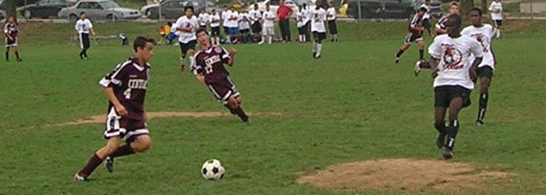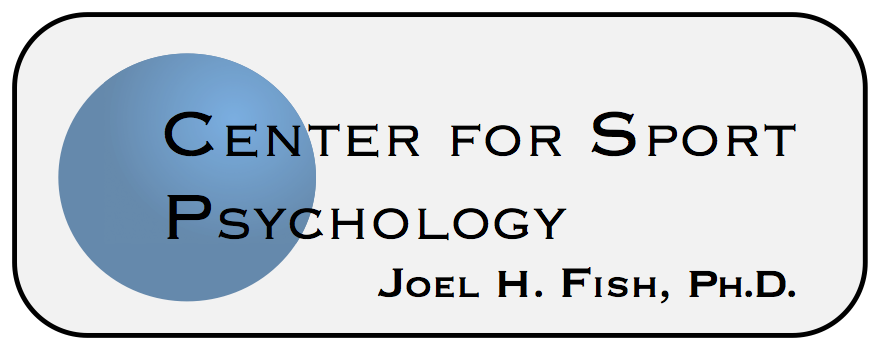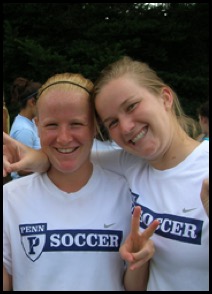Youth Sports Presentations

The following Youth Sport, Parent, Recreation, Camp, and Community Organization Presentations are currently offered by the Center for Sport Psychology.
101 Ways to be a Terrific Sports Parent
What role do sports have in my child's life? How can I help my child find a sport he/she will enjoy? Am I pushing my child too hard in sports? Not hard enough? How can I best help my child get the most out of sports and reach his/her full potential? Learn how to help your child get more from their sporting activities -- at the playground, playing intramurally, or playing at the competitive level. Based on Dr. Joel Fish's book, 101 Ways to be a Terrific Sports Parent.
Sportsmanship & Ethical Behavior
There is more cheating and poor sportsmanship in school sports and youth sports today than ever before. This presentation will identify the reasons for the lack of sportsmanship and ethical behavior in sports today. In addition, specific ways will be offered to promote fair play, positive sportsmanship, healthy competition, and ethical behavior in youth sport athletics.
Teaching Life Skills Through Sports Programming
"Do sports really build character?" Sports, fitness, recreation, and exercise can be a vehicle to learn important life skills. A healthy body is definitely related to a healthy mind. This seminar will focus on how to structure sports experiences to maximize positive self-esteem, self-confidence, teamwork, goal setting, and self-discipline.
Hazing & Initiations
Is it a good-natured joke? Or abuse? Is it a continuation of tradition? Or is it a criminal act? There is evidence that hazing and initiations remain a significant problem on school athletic teams, in youth sport organizations, and in summer camp programs. This presentation will help define where tradition stops and abuse begins. In addition, learn effective programming strategies to reduce harmful rituals as well as develop more constructive teambuilding traditions
Healthy vs. Unhealthy Competition
This session will help parents, teachers, administrators and students understand competition in their lives today, and how competition in today's society differs from 10, 20, 30 and 40 years ago. Healthy versus unhealthy competition will be defined and techniques will be offered to help participants be better able to respond to competition in a positive manner.
Skills to be a Terrific Team Leader
There is evidence that team leaders rate their athletic experience as less enjoyable than non-team leaders. The key to improve team leader effectiveness is to teach them the skills necessary to play this important role. This presentation identifies key issues for team leaders and teaches skills in the areas of conflict resolution with teammates, communicating with coaches, and motivating different personality types.
How to Create a Positive Athletic Environment
The key to continued youth sport participation is a positive athletic environment. Issues to be discussed include motivation, temper control, positive attitude, teamwork, and basic do's and don'ts when working with athletes of varying skill levels.
Who Is Today's Youth Sport Athlete?
"Why can’t they be more like we were?" Youth sport athletes today are different than they were 10, 20, 30 and 40 years ago. We can either be angry with today's athletes or learn to work better with them. Learn the latest information on male and female youth sport athlete’s attitudes about winning, losing, success, failure, competition, and off-the-field behavior choices. In addition, learn the strategies to more effectively teach and communicate with today’s youth sport athletes.
Teambuilding and Motivation
"A house divided cannot stand." Methods will be identified to respond to individual, group, and team conflicts as well as to improve communication, problem solving, and decision making. Symptoms of competitive stress, and mental blocks to peak performance, will also be discussed.
Kids Aren't Pro Athletes
"Is winning everything and the only thing?" This may be true for pro athletes, but not for kids. This session will help participants define their attitudes about competition, winning, losing, athletic competition, physical fitness, and gender issues. Emphasis will be placed on understanding special developmental issues in order to keep sports enjoyable for boys, girls, and teens.
Reducing Risky Athlete Behavior
Being an athlete is not all fun and games. Innovative strategies and programming ideas will be offered to help respond to the unique pressures on athletes, including: the self confidence and low self esteem issues, gender issues, substance abuse, eating disorders, gambling, sexual misconduct and relationship violence. In addition, learn to identify positive methods for stress management, celebration, communication, and teamwork.
More Presentations



